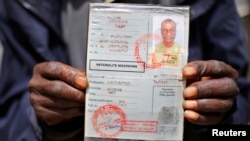The U.N. refugee agency says thousands of refugees and asylum seekers in Libya are desperately seeking to leave the country.
With nearly 37,000 UNHCR-registered refugees in Tripoli and Benghazi, the agency says many are living in areas heavily damaged by fighting, unable to move to safer areas because of ongoing clashes.
“In Tripoli alone, more than 150 people of Eritrean, Somali and other nationalities have been phoning our protection hotline desperately seeking help with medicines and a safer place to stay," said UNHCR spokeswoman Ariane Rummery, adding that the agency is also receiving calls from Syrians and Palestinians located near Benghazi.
"Among this group, we are particularly concerned about a number of unaccompanied minors as well," Rummery said.
Libya has been slipping deeper into chaos since intense fighting erupted nearly three weeks ago in Tripoli and Benghazi, Libya's second largest city.
According to UNHCR, smugglers are exploiting the circumstances as thousands of people desperate to leave the area are risking their lives by taking dangerous sea journeys across the Mediterranean to Europe.
Fighting near Tripoli has not stopped boats from leaving, Rummery said, as departure points have simply moved eastward, away from the battle zone.
“More boats are now leaving from points such as Al-Khums and Benghazi," she said. "We recently heard of a group of 500 Syrians who left in about three boats toward Italy from Benghazi, and this is a new and much more dangerous journey because it takes longer to reach Italy. Over 1,000 people have died in the Mediterranean this year and the latest casualties drowned last week off Al-Khums, which is about 100 kilometers east of Tripoli. The 128 victims were of mostly African nationalities and included many women and children.”
The thousands of people trying to flee Libya by land are being blocked by various travel restrictions, UNHCR reports. The refugee agency is urging Libyan authorities to relax exit visa restrictions to allow people to leave while calling Egyptian and Tunisian officials to open border crossings to those fleeing violence and seeking international protection.




